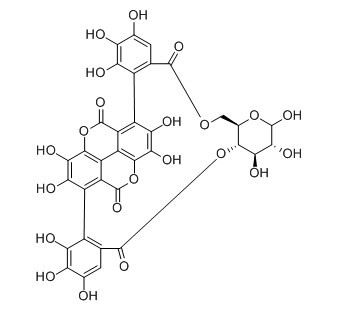Punicalin
Punicalin exerts anti-inflammatory, antioxidative, and anti-hepatotoxic activities, it shows inhibitory activity on HIV-1 reverse transcriptase in a dose-dependent manner, with an IC50 of 0.11 microg/ml (0.14 microM).
Inquire / Order:
manager@chemfaces.com
Technical Inquiries:
service@chemfaces.com
Tel:
+86-27-84237783
Fax:
+86-27-84254680
Address:
1 Building, No. 83, CheCheng Rd., Wuhan Economic and Technological Development Zone, Wuhan, Hubei 430056, PRC
Providing storage is as stated on the product vial and the vial is kept tightly sealed, the product can be stored for up to
24 months(2-8C).
Wherever possible, you should prepare and use solutions on the same day. However, if you need to make up stock solutions in advance, we recommend that you store the solution as aliquots in tightly sealed vials at -20C. Generally, these will be useable for up to two weeks. Before use, and prior to opening the vial we recommend that you allow your product to equilibrate to room temperature for at least 1 hour.
Need more advice on solubility, usage and handling? Please email to: service@chemfaces.com
The packaging of the product may have turned upside down during transportation, resulting in the natural compounds adhering to the neck or cap of the vial. take the vial out of its packaging and gently shake to let the compounds fall to the bottom of the vial. for liquid products, centrifuge at 200-500 RPM to gather the liquid at the bottom of the vial. try to avoid loss or contamination during handling.
Viruses.2017, 9(10)
J Plant Biotechnol.2023, 50:070-075.
Braz J Biol.2023, 82:e266573.
Evid Based Complement Alternat Med.2021, 2021:5585692.
Int J Mol Sci.2023, 24(8):7300.
J Nat Prod.2022, 85(5):1351-1362.
Asian J of Pharmaceutical&Clinical 2018, 11(2)
Food Structure2023, 36:100324.
Molecules2022, 27(14),4462
Nat Prod Sci.2016, 22(2)
Related and Featured Products
Am J Chin Med. 1999;27(3-4):371-6.
Effects of punicalagin and punicalin on carrageenan-induced inflammation in rats.[Pubmed:
10592846]
Punicalagin and Punicalin were isolated from the leaves of Terminalia catappa L.
METHODS AND RESULTS:
In this study, we evaluated the anti-inflammatory activity of punicalagin and Punicalin carrageenan-induced hind paw edema in rats. After evaluation of the anti-inflammatory effects, the edema rates were increased by carrageenan administration and reduced by drug treatment. After 4 hr of carrageenan administration, the best effect group was the punicalagin (10 mg/kg) treated group (inhibition rate was 58.15%), and the second was the punicalagin (5 mg/kg)-treated group (inhibition rate was 39.15%). However, even if the anti-inflammatory activity of punicalagin was the same as Punicalin at the 5 mg/kg dose, the inhibition effect from larger doses of punicalagin was increased, but there was a decrease with a larger dose of Punicalin.
CONCLUSIONS:
The data showed that both punicalagin and Punicalin exert anti-inflammatory activity, but treatment with larger doses of Punicalin may induce some cell damages.
J Pharm Pharmacol. 1998 Jul;50(7):789-94.
Antioxidant and hepatoprotective activity of punicalagin and punicalin on carbon tetrachloride-induced liver damage in rats.[Pubmed:
9720629]
Punicalagin and Punicalin, isolated from the leaves of Terminalia catappa L., are used to treat dermatitis and hepatitis. Both compounds have strong antioxidative activity. The antihepatotoxic activity of punicalagin and Punicalin on carbon tetrachloride (CCl4)-induced toxicity in the rat liver was evaluated.
METHODS AND RESULTS:
Levels of serum glutamate-oxalate-transaminase and glutamate-pyruvate-trans-aminase were increased by administration of CCl4 and reduced by drug treatment. Histological changes around the liver central vein and oxidation damage induced by CCl4 also benefited from drug treatment. The results show that both punicalagin and Punicalin have anti-hepatotoxic activity but that the larger dose of Punicalin induced liver damage.
CONCLUSIONS:
Thus even if tannins have strong antioxidant activity at very small doses, treatment with a larger dose will induce cell damage.
Phytother Res. 2004 Aug;18(8):667-9.
Two ellagitannins from the leaves of Terminalia triflora with inhibitory activity on HIV-1 reverse transcriptase.[Pubmed:
15472920]
The bioassay- guided fractionation of the aqueous extract of Terminalia triflora leaves afforded Punicalin and 2-O-galloylPunicalin, isolated for the first time from this species.
METHODS AND RESULTS:
These compounds showed inhibitory activity on HIV-1 reverse transcriptase in a dose-dependent manner. Punicalin showed an IC(50) of 0.11 microg/ml (0.14 microM) and 2-O-galloylPunicalin an IC(50) of 0.10 microg/ml (0.11 microM).



